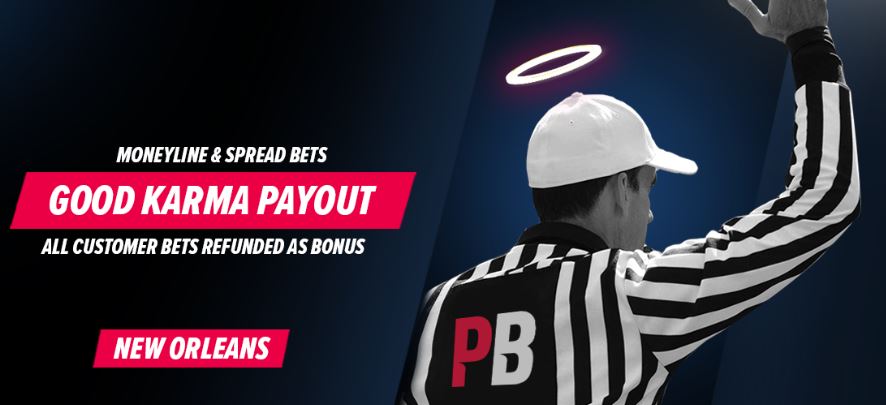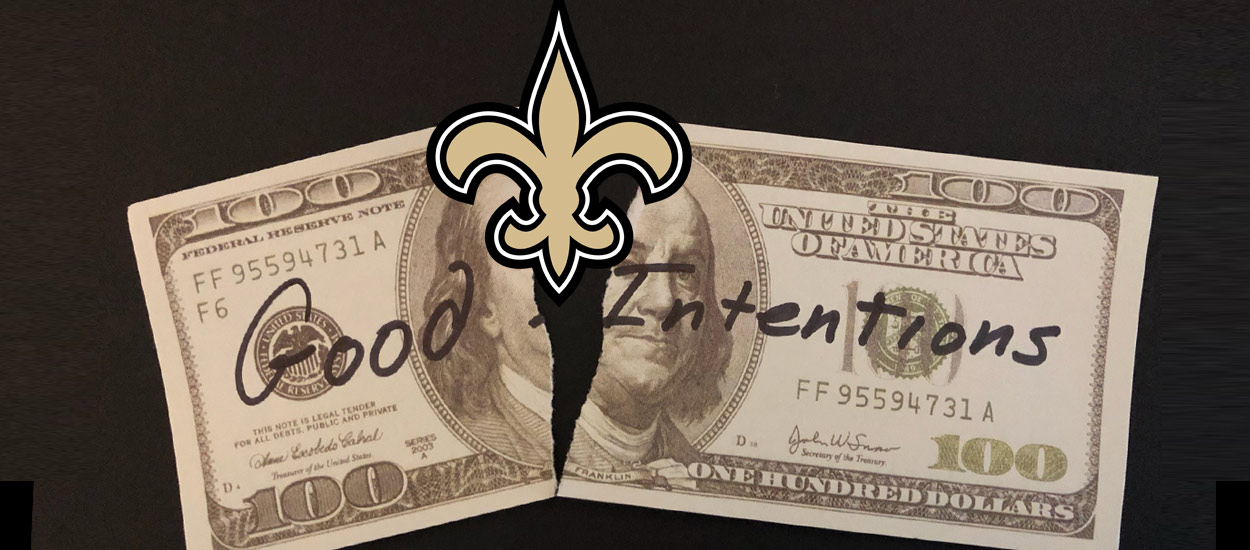Refunding bets is nothing new
Make no mistake about it, Nickell Robey-Coleman should have been flagged for pass interference against Tommylee Lewis in the NFC Championship game between the Saints and Rams. It was blatant and it was a horrible missed call by the referees that likely cost New Orleans the game. But that wasn’t the first bad call by a referee, umpire or other official that cost a team a game and it won’t be the last.
Who can forget the Green Bay vs. Seattle football game with the replacement refs when M.D. Jennings clearly intercepted Russell Wilson’s pass in the end zone only to have it ruled a completed catch by Golden Tate? Not only was that a horrible call, but Tate also interfered with Sam Shields by pushing him to the ground while the ball was in the air. It was the one play that led the NFL to finally settle the labor dispute with the regular referees.
As well in baseball many will recall Don Denkinger calling Jorge Orta safe at first base when he was out by about 5 feet in the 9th inning of the 1985 World Series. That would have likely clinched the World Series for the St. Louis Cardinals, but instead the Royals turned that blown call into two runs and went on to win that game and the World Series. In hockey, the Toronto Maple Leafs looked destined to beat the Los Angeles Kings in the 1993 Stanley Cup playoffs when they were leading 3 games to 2, but referee Kerry Fraser missed a blatant high stick by Wayne Gretzky on Doug Gilmour in a tied 6th game. The high stick should have resulted in a 4-minute power play for the Leafs. Instead, Gretzky did not get a penalty and went on to score the winning goal, when he should have been in the penalty box. Fraser admitted he made a mistake after and was hated by Leafs fans for years after. And in boxing who can forget when Roy Jones Jr. destroyed Park Si-Hun in the 1988 Seoul Olympics, including forcing two standing 8 counts but still lost on a clearly biased judge’s decision? The bottom line is these things happen. For whatever reason officials make mistakes and sportsbooks in Vegas, in Europe and offshore just pay out the contest based on the official result of the game. So, when it was announced on Monday that a sportsbook called PointsBet, an Australian company that is licensed by the New Jersey Division of Gaming Enforcement (DGE), planned to refund losing wagers on the New Orleans Saints as a result of the blown call it created a lot of media attention. No doubt everyone who bet on New Orleans with the company got a sense of relief, although they still likely would have preferred to win than push, but it raises questions whether this was a good move . . . and whether it is best for the sports betting industry.
The bottom line is these things happen. For whatever reason officials make mistakes and sportsbooks in Vegas, in Europe and offshore just pay out the contest based on the official result of the game. So, when it was announced on Monday that a sportsbook called PointsBet, an Australian company that is licensed by the New Jersey Division of Gaming Enforcement (DGE), planned to refund losing wagers on the New Orleans Saints as a result of the blown call it created a lot of media attention. No doubt everyone who bet on New Orleans with the company got a sense of relief, although they still likely would have preferred to win than push, but it raises questions whether this was a good move . . . and whether it is best for the sports betting industry.
Having covered the online gambling industry since its inception and the offshore telephone wagering industry for about five years prior to that, I can assure you that what PointsBet is doing is nothing new. In the past many offshore companies have told players they would refund wagers on bad beats as a goodwill gesture, but almost every time those businesses resented the decision. Many companies that made that decision ended up shutting down and the ones that are still around have constantly had to defend their move every time they didn’t pay out a bad bet as a winner.
So, here are the 4 main reasons why I believe PointsBet is making a bad decision and why they will resent their offer, especially one made so publicly.
Refunding losing wagers sets a bad precedent
Since sports betting has just begun in New Jersey, it’s likely that PointsBet doesn’t have a huge customer base yet. So, to say they are going to refund these losing wagers now may not be a big deal, but it might be if the company grows significantly. Say PointsBet has tens of thousands of large playing customers who wager on the Super Bowl in 2020 and the same type of incident happens. If PointsBet says they are just going to pay on the winning result they will get massive complaints from bettors who will say that the company already made it clear they refund losses on games decided by blatant blown calls and the company really has no defense. In fact, the website states that, "PointsBet will decide from time-to-time to perform a Good Karma Payout at their absolute discretion."
And if an umpire calls a strike on a bases loaded 9th inning pitch that is a clear ball and would have given a team a walk and the win, bettors will argue that the missed call (which isn’t reviewable) must be paid as a push to bettors of the losing team as a result of this precedent. And if a NASCAR driver is leading by 5 seconds with 3 laps to go and is easily on his way to the win, but loses as a result of a phantom debris caution, bettors will argue that the bet should be refunded since the caution was a bad official’s decision and the company has to refund the loss.
And this has indeed happened both offshore and in Europe. When Rubens Barrichello pulled over his Ferrari to give Michael Schumacher the win in the 2002 Austrian Grand Prix, bettors went wild. Yet the official response by almost every single European sportsbook was that they must pay out according to the rules and the result because doing otherwise sets a bad precedent. In some cases, books did refund or even pay out as a winner bets on Barrichello to good customers who complained, but those manager decisions were done silently and with the understanding it was a one-off and most importantly it was done privately and silently. And this decision could get the DGE involved as well in the future, since if bettors believe the company has made a precedent, they can take it up with the regulator to decide if PointsBet must live up to past decisions. And as we know most court rulings based on precedent.
It goes against the official rules
The payout rules in any game are very clear. The game will be paid based on the official results as posted on the regulating body’s website, i.e. NFL.com, NBA.com, etc. And the rules also state that subsequent decisions or errors will not nullify the original results. So, by paying winning bettors and refunding losing tickets, the company has effectively changed the rules. Obviously, PointsBet would disagree by saying they have paid the winner as required and only offered the refund to the losing side as a gesture that is independent of the game result, but that is questionable.
It hasn’t even been a year since the Supreme Court overturned PASPA and there is a call by many politicians to create a federal sports betting law instead of individual state sanctioned laws, and one of the reasons given by federal legislators, like Senator Orrin Hatch, is that all states may not play by the same rules, so a federal law is necessary to create consistency. This type of decision by PointsBet only gives the likes of Orrin Hatch some fodder as to why you can’t have different laws in New Jersey that apparently allows their companies to pay out both sides of a bet and Nevada which always pays out only the winning side. And in the infant stages of non-Nevada U.S. sports betting it’s probably best for companies not to get too cute with their payout decisions and just settle results as is mandated by the DGE rules.
It puts the competition in an uncomfortable situation
This may be one of the biggest reasons why Pointsbet’s decision is bad. The decision was clearly made to try and win new customers by being 'better' than the competition. But, it puts the likes of FanDuel, Draftkings, William Hill, 888, etc. into a bad spot. By offering this payout, PointsBet is effectively telling New Jersey bettors to play with them over other companies because PointsBet has the player’s backs when the game is decided in an unconventional matter. And undoubtedly other sports books in New Jersey are getting complaints by New Orleans bettors as to why their bets are being graded as losers, putting those books into an unfair situation of justifying why they are adhering to the set rules and are not following in PointsBet’s footsteps. And these companies shouldn’t have to defend a decision to pay out according to the terms and conditions.
While I understand it’s a small market with a lot of competition, and with the splash in social media this may turn out to be brilliant, but there are better ways to get customers whether it be through signup bonuses, promotions or cashback on losses. And promotions, like those at European giants, Bet365, where a money line bet is paid out early if a team goes up by 14 points, is a great offer to bettors of that site and one that would have resulted in a first quarter winning payout for New England bettors and for Philadelphia bettors in the prior week. But trying to attract customers by placing other books in a bad situation is not fair to the other sportsbooks in New Jersey.
It encourages the worst of bettors to sign up
In the early days of online betting offshore I recall hundreds of books opened with crazy offers. Examples were 100% match bonuses with no rollover requirement; 50% reload bonuses with no rollover requirements; free bets for signing up with very small rollover requirements; no vig wagering, etc. My all-time favorite was one by Mansion Sportsbook.
The company made an offer to anyone who signed up, although at the time they were trying to entice U.S. bettors. The signee had to wager $1,100 to win $1,000 on the Pittsburgh Steelers vs. the Miami Dolphins in the season opener. If Pittsburgh covered the company would pay them out as a winner. If the Steelers lost, then the bets would be refunded. There was no rollover requirement and no requirement to keep any money in the account. So, it was a no risk $1,000 promotion. Two thousand people took advantage of the offer (the max they allowed) and many bettors signed up with multiple accounts under different names and email addresses using different payment methods. The Steelers clobbered the Dolphins. The company paid the winning tickets, refunded the losers, and people at Mansion told me that less than 2% ofthe players that took advantage of the 'no-risk' bet kept any money at the sportsbook. The rest took their full withdrawal (mostly via NETeller or Moneybookers) never to be heard from again.
It was a terrible promotion that cost the company $2 million and worse, they were forced to cut off U.S. customers after passing of the UIGEA. The sportsbook eventually shut down altogether and is now just a casino site. But these offers just inspired the worst of the worst in betting to come forward. The term "bonus whores", "shot takers" and "whiners" became common terms in sportsbook betting forums. It was clear that the sportsbooks and most of the good players hated them, but those who fell into the category said they are simply taking advantage of poor management decisions. That is why companies like The Greek, who proudly advertises "Sweat the Game, Not the Payout" along with Pinnacle Sports and Bookmaker are proud to say that they attract good customers and are very successful and in operation for decades because they set clear rules and pay out quickly according to those rules. They know the bonus whores and complainers aren’t a big concern to them since those people aren’t attracted to books like The Greek who play and pay by the rules.
So only time will tell if this decision by PointsBet will prove to be brilliant or a mistake that the company will live to regret. My guess is it will be the latter.
Read insights from Hartley Henderson every week here at OSGA and check out Hartley's RUMOR MILL!







































